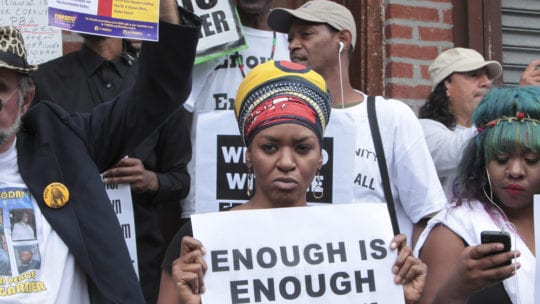
On Monday, Aug. 19, the NYPD announced that it was firing Officer Daniel Pantaleo as a result of his actions during a July 2014 incident. Officer Pantaleo attempted to arrest Staten Island resident Eric Garner for selling untaxed cigarettes that July day.
After slightly more than five years of local and federal debate, investigations and hearings surrounding the incident, it seemed that Pantaleo might get off with a slap on the wrist. Federal authorities decided to forego charges against Pantaleo. The officer remained employed, working inside the Staten Island precinct offices.
Resisting Arrest
During the 2014 incident, police claimed, Garner resisted arrest. Pantaleo grabbed Garner, and the two men struggled. Later, the officer put Garner in a chokehold for several seconds. The two fell against a window and then to the ground. The chokehold triggered an asthma attack, which eventually led to Garner's death. Chokeholds are not permitted for extended periods, per NYPD regulations.
A video of the Garner-Pantaleo incident went viral. Similar to other such incidents, it was seen as one in a series of race-related examples of police brutality.
A Well-Crafted Announcement
Commissioner James O'Neill's announcement of the firing was nicely written. It was human, heartfelt and transparent. People on both sides of the issue, of course, will attack it, just as they've whacked O'Neill's decision to fire Pantaleo. Below are excerpts from his statement. The full text can be accessed at the link above.
"I served for nearly 34 years as a uniformed New York City cop...I can tell you that had I been in Officer Pantaleo’s situation, I may have made similar mistakes...And I would have wished that I had released my grip before it became a chokehold.
Being a police officer is one of the hardest jobs in the world. That is not a statement to elicit sympathy from those we serve; it is a fact. Cops have to make choices, sometimes very quickly, every single day. Some are split-second life-and-death choices.
But none of us can take back our decisions, most especially when they lead to the death of another human being.
There are absolutely no victors here today...
We must move forward together as one city, determined to secure safety for all – safety for all New Yorkers and safety for every police officer working daily to protect all of us."
Waiting Too Long
“In this case, the unintended consequence of Mr. Garner’s death must have a consequence of its own,” O'Neill said. A former officer, O'Neill acknowledged that he is biased toward loyalty and camaraderie among fellow officers. The commissioner also admitted that Pantaleo's firing reminds citizens that the NYPD is capable of change.
Commissioner O’Neill and Mayor Bill de Blasio hoped yesterday’s announcement would be a form of closure. The city has “finally seen justice done,” the mayor said during a news conference. But closure doesn't appear to be on the agenda for either side of the situation.
Attacks from Both Sides
Moments after the announcement, attacks came from both sides. Garner's family criticized the police and city for waiting so long to act. Pantaleo’s actions clearly constitute a form of police brutality, they argued. The Rev. Al Sharpton, a Garner family advisor, said the firing hardly suffices. The decision to terminate the officer, he said, is “nothing to celebrate.” Pantaleo “will go home a terminated man,” but the Garner family “had to go to a funeral.” In this, Sharpton agreed with O'Neill on the lack of victors in this battle.
Emerald Snipes, Garner’s daughter, was thankful for O’Neill’s decision. Still, the 26-year-old vowed to dedicate her life to police reform. Her goal, she said, is to never again see an Eric Garner situation.
While de Blasio and O'Neill said many right things during the five years since Garner's death, reputational damage to the NYPD was extensive. In PR there's often talk about the importance of response time during a crisis. This incident provides an example of what the passage of time looks like.
Conflicting Messages
Police supporters complained that Pantaleo, an officer with an exemplary record (300 arrests, 14 departmental medals), made a snap decision in a tense situation. This camp claims Pantaleo is a scapegoat in a large, socio-political drama. They believe O’Neill folded under pressure from Mayor DeBlasio, who is seeking the Democratic nomination for president.
Police Benevolent Association president Patrick Lynch left little to the imagination in bashing O’Neill's decision. The commissioner, he said in a statement, “has chosen politics and his own self-interest over the police officers he claims to lead.”
Typical of this group's view was a tweet from Bo Deitl, the former NYPD detective, actor, author and media personality.
Commissioner @NYPDONeill. Did you forget your time working on the streets? This is a very bad move, Officer Pantaleo was just doing his job. The effects on morale throughout the NYPD will be terrible.
— Bo Dietl (@BoDietl) August 19, 2019
Whatever the effects of Pantaleo's firing, that organizations and groups associated with the NYPD don't support it leaves the impression that little has changed. The groups' negative response also hurts Commissioner O'Neill's claim that the NYPD cares about mending its image. At this point, the road ahead seems difficult.
Seth Arenstein is editor of PRNEWS. Follow him at: @skarenstein
